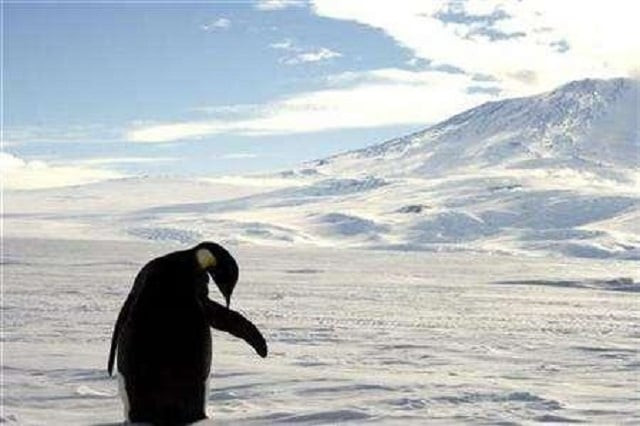Student's idea leads to discovery of 'largest volcanic region on Earth'
91 volcanoes ranging in height from 100m to 3,850m have been found through remote survey

PHOTO: REUTERS
Ninety-one volcanoes ranging in height from 100m to 3,850m have been found through a remote survey in an area known as West Antarctic Rift System. It bears resemblance to east Africa’s volcanic ridge, which is currently known to be the densest concentration of volcanoes on the planet.
Climate change shows in shrinking Antarctic snows
Researchers from University of Edinburgh remotely surveyed the underside of the ice sheet for concealed peaks of basalt rock, similar to those of other volcanoes in the vicinity whose tips push against the ice. The shape of the land beneath was analysed through ice-penetrating radars, and then compared with findings from aerial surveys and satellite and database records.
Max Van Wyk de Vries, a third-year student at the University of Edinburgh was the first to propose the study. It will help scientists comprehend the role played by volcanoes in long-term fluctuations in the ice sheet and the ways in which climate change has affected Antarctica.
Mr Van Wyk de Vries said: "Antarctica remains among the least studied areas of the globe, and as a young scientist I was excited to learn about something new and not well understood."
"After examining existing data on West Antarctica, I began discovering traces of volcanism. Naturally I looked into it further, which led to this discovery of almost 100 volcanoes under the ice sheet."
Pakistan under strong influence of climate change
The results do not make any conclusions regarding the activity level of the volcanoes, but it can contribute towards ongoing research regarding seismic monitoring in the region. According to previous research, there may have been volcanic activity in the area during warmer periods, which could increase if ice thins in a warming climate.
"It is fascinating to uncover an extensive range of volcanoes in this relatively unexplored continent. Better understanding of volcanic activity could shed light on their impact on Antarctica's ice in the past, present and future, and on other rift systems around the world," said Dr Robert Bingham, of the University of Edinburgh's School of GeoSciences
The research has been published in the Geological Society Special Publications series.
This story originally appeared on The Independent.


















COMMENTS
Comments are moderated and generally will be posted if they are on-topic and not abusive.
For more information, please see our Comments FAQ